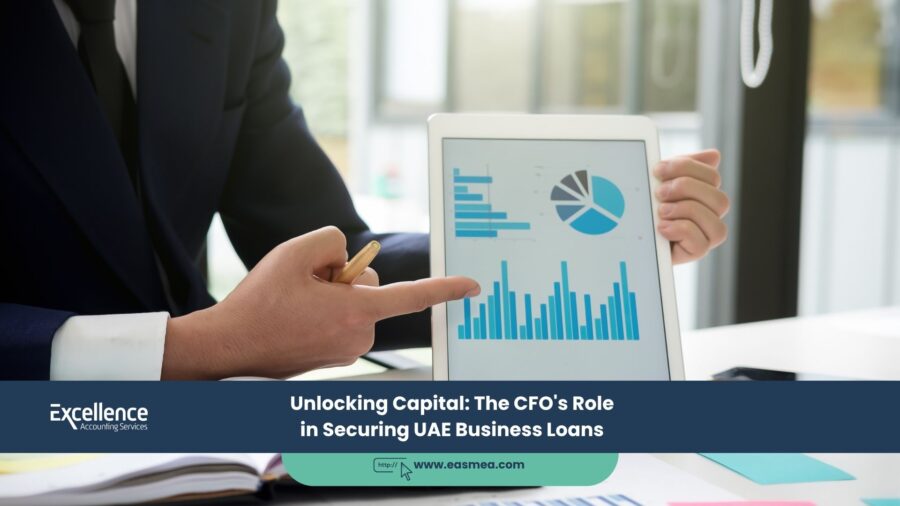Unlocking Capital: The CFO’s Role in Securing UAE Business Loans
For any ambitious SME in the UAE, capital is the lifeblood of growth. Whether it’s to fund a major expansion, invest in new technology, manage working capital, or seize a strategic opportunity, access to financing is often the critical factor that separates stagnation from success. While the UAE boasts a robust and competitive banking sector, securing a business loan is far from a simple transaction. Banks and financial institutions are not just lending money; they are making a calculated investment, and they demand a high level of confidence in a borrower’s ability to repay.
- Unlocking Capital: The CFO's Role in Securing UAE Business Loans
- Before the Application: How a CFO Prepares the Business for Debt
- The CFO as the Financial Storyteller
- Navigating the Process and Negotiating Terms
- How Excellence Accounting Services (EAS) Can Be Your Financial Partner
- Frequently Asked Questions (FAQs)
- Is Your Business Ready for Financing?
This is where the role of a strategic Chief Financial Officer (CFO) becomes invaluable. Many business owners approach banks with passion and a great idea, only to be met with rejection due to incomplete financial records, weak projections, or an inability to articulate a compelling financial narrative. A CFO, whether in-house or fractional, transforms the loan application process from a hopeful request into a strategic, data-driven proposal. They are the bridge between the CEO’s vision and the banker’s need for security and confidence.
This guide explores the pivotal role a CFO plays in unlocking capital for UAE businesses. We will delve into how they prepare the company, craft the financial story, manage the process, and negotiate terms to ensure your business not only gets the loan but gets it on the best possible terms. For any SME looking to fuel its growth engine, understanding this role is the first step to opening the doors of finance.
Key Takeaways
- A CFO Builds Credibility: They transform a loan application from a simple request into a professional, data-backed business case that inspires confidence in lenders.
- Financial Storytelling is Key: A CFO doesn’t just present numbers; they craft a compelling narrative around them, explaining past performance and demonstrating future potential.
- Preparation is Everything: They ensure all financial records are immaculate, forecasts are robust, and a comprehensive loan package is prepared *before* approaching the bank.
- Risk Mitigation for Lenders: By implementing strong internal controls and demonstrating a clear understanding of risks, a CFO shows the bank that their investment will be safe.
- Expert Negotiation: A CFO’s expertise allows them to negotiate better terms, including interest rates, covenants, and repayment schedules, saving the company significant money over the life of the loan.
Before the Application: How a CFO Prepares the Business for Debt
The work of securing a loan begins long before the first meeting with a banker. A strategic CFO lays the groundwork internally to make the company “loan ready.” This involves three critical stages of preparation.
1. Fortifying the Financial Foundation
Lenders scrutinize a company’s financial health with a fine-toothed comb. A CFO ensures the books are not just clean, but tell a story of stability and competence.
- Impeccable Bookkeeping and Accounting: Ensuring all financial records are up-to-date, accurate, and compliant with International Financial Reporting Standards (IFRS). This includes diligent account reconciliation.
- Audited Financial Statements: Arranging for an external audit provides an independent stamp of approval on the financials, which is highly valued by banks.
- Managing Debt-to-Equity Ratio: Proactively managing the company’s balance sheet to ensure its leverage ratios are within acceptable industry norms before applying for more debt.
2. Developing a Robust Financial Model and Forecast
Banks lend based on a company’s future ability to generate cash flow. A CFO builds the financial model that proves this ability.
- Detailed Financial Projections: Creating integrated, three-statement (P&L, Balance Sheet, Cash Flow) models that project performance for the next 3-5 years.
- Assumption-Based Forecasting: Clearly documenting all key assumptions behind the forecast (e.g., market growth, pricing, cost inflation). This shows the bank that the projections are based on thoughtful analysis, not just wishful thinking.
- Scenario and Sensitivity Analysis: Modeling different scenarios (best case, base case, worst case) to show how the business would perform under stress. This demonstrates proactive risk management.
3. Crafting the Comprehensive Loan Proposal
The CFO compiles all the necessary information into a professional loan package. This is far more than just an application form; it’s a complete business case for the loan.
A loan proposal prepared by a CFO is not a request for money; it is an investment memorandum presented to a potential business partner—the bank. It anticipates every question and provides every necessary piece of data upfront.
| Component of a Loan Package | Purpose | CFO’s Contribution |
|---|---|---|
| Executive Summary | A concise overview of the business and the loan request. | Crafts a compelling summary that grabs the lender’s attention. |
| Business Profile & History | To provide context on the company’s operations and achievements. | Highlights key milestones and demonstrates a track record of success. |
| Financial Statements (Past 3 Years) | To show historical performance and financial health. | Ensures statements are audited, accurate, and professionally presented. |
| Detailed Financial Projections | To demonstrate future repayment capacity. | Builds a credible, assumption-driven financial model. |
| Use of Funds Statement | To explain exactly how the loan will be used. | Provides a detailed breakdown of how the capital will generate a return. |
| Management Team Bios | To show the strength and experience of the leadership. | Highlights the financial acumen and experience of the management team. |
The CFO as the Financial Storyteller
Numbers alone can be dry and unconvincing. A CFO’s most crucial role during the loan process is to be the chief storyteller, weaving the data into a compelling narrative that resonates with lenders.
Connecting Past Performance to Future Growth
The CFO doesn’t just present historical financials; they interpret them. They explain the “why” behind the numbers. For example:
- “Our revenues grew by 30% last year due to our successful entry into the Abu Dhabi market, and our projections show a similar trajectory as we expand into Sharjah.”
- “You’ll notice a dip in our gross margin in Q3; this was a strategic decision to invest in higher-quality raw materials, which has since led to a 15% increase in customer retention.”
Justifying the “Ask”
The CFO must clearly articulate how the loan will be a catalyst for growth and, therefore, generate the cash flow needed for repayment. They answer the question: “Why do you need this money, and how will it make you stronger?”
- For Expansion: “This AED 2 million loan will fund the fit-out of our new production line. As our feasibility study shows, this line will increase our capacity by 50% and allow us to service the new contract we’ve secured with XYZ Corp, generating an additional AED 3 million in annual revenue.”
- For Working Capital: “This AED 500,000 line of credit will allow us to offer more favorable payment terms to larger clients, unlocking a new segment of the market and increasing our average deal size.”
Navigating the Process and Negotiating Terms
Once the proposal is submitted, the CFO’s role shifts to that of a project manager and lead negotiator.
Managing the Lender Relationship
The CFO becomes the primary point of contact for the bank. They manage the flow of information, respond to queries promptly and professionally, and build a relationship based on trust and transparency. This proactive communication can significantly speed up the approval process.
Negotiating Beyond the Interest Rate
While the interest rate is a key factor, a savvy CFO knows that many other aspects of the loan agreement are negotiable and can have a significant impact on the business.
- Covenants: These are conditions the business must meet, such as maintaining a certain debt service coverage ratio. A CFO will negotiate for less restrictive covenants to give the business more operational flexibility.
- Reporting Requirements: Negotiating the frequency and detail of financial reporting to be manageable for the business.
- Fees and Charges: Scrutinizing and negotiating arrangement fees, prepayment penalties, and other hidden costs.
- Security/Collateral: Negotiating the specific assets pledged as collateral to minimize the risk to the business and its owners.
How Excellence Accounting Services (EAS) Can Be Your Financial Partner
For many SMEs, the expertise of a full-time CFO is out of reach, yet the need for strategic financial guidance during critical processes like fundraising is paramount. EAS bridges this gap with our Fractional CFO Services.
We act as your strategic partner to:
- Prepare Your Business for Financing: We conduct a thorough accounting review, clean up your books, and help you prepare for the scrutiny of lenders.
- Develop Bank-Ready Financial Models: Our experts build the detailed financial projections and scenario analyses that banks require.
- Compile a Professional Loan Package: We assemble a comprehensive and persuasive loan proposal that presents your business in the best possible light.
- Provide Strategic Negotiation Support: We leverage our experience to help you understand and negotiate loan terms, ensuring you get a deal that supports, rather than constrains, your growth.
With EAS, you gain the strategic advantage of a high-caliber CFO, empowering you to unlock the capital your business needs to thrive.
Frequently Asked Questions (FAQs)
The most common reasons include: poor or incomplete financial records, unrealistic financial projections, a lack of a clear business plan, a high debt-to-equity ratio, insufficient collateral, and a failure to clearly articulate how the loan will be used to generate returns. A CFO’s primary job is to address every one of these potential rejection points before the application is even submitted.
It is extremely important. Banks in the UAE rely on credit reports from the Al Etihad Credit Bureau (AECB). A CFO ensures the company’s credit history is clean by managing payments diligently and rectifying any errors on the report. They also prepare a narrative to explain any past issues, if necessary.
The DSCR is a key metric banks use to assess repayment ability. It is calculated as (Net Operating Income) / (Total Debt Service). A ratio of 1.0 means you have exactly enough income to cover your debt payments. Banks typically want to see a ratio of 1.25x or higher, which indicates a healthy cash cushion. A CFO will calculate and highlight a strong DSCR in the loan proposal.
Absolutely. For the specific, project-based task of securing a loan, a Fractional CFO is often more effective. They bring a wealth of experience from working with multiple companies and banks, and they can dedicate focused time to the loan application process without being distracted by the day-to-day operational duties of a full-time employee.
Yes, this is where a CFO is perhaps most critical. For a startup, the loan application is based almost entirely on the quality of the financial projections and the business plan. A CFO can build a highly detailed, assumption-driven financial model and a comprehensive feasibility study that gives the bank confidence in the venture’s potential, even without a track record.
This varies, but common forms of collateral include commercial property, accounts receivable (invoice financing), inventory, and equipment. In many cases for SMEs, banks will also require personal guarantees from the business owners. A CFO can help value these assets and negotiate which ones are pledged.
Covenants are rules or conditions in the loan agreement that the borrower must adhere to. A ‘positive’ covenant might be a requirement to provide audited financials annually. A ‘negative’ covenant might restrict the company from taking on more debt or selling major assets without the bank’s permission. A CFO can negotiate these terms to ensure they are not overly restrictive and won’t hinder the company’s future growth plans.
A CFO’s role is even more important. They can clearly explain the benefits and regulations of the specific free zone, detail the company’s compliance with rules regarding substance and governance, and structure the financial reporting to give mainland banks a clear understanding of the Free Zone Entity’s (FZE) financial health.
A sensitivity analysis is a financial model where you change key variables to see how it impacts the outcome (e.g., “What happens to our net profit if our raw material costs increase by 10%?”). A CFO prepares this to show the bank that they have considered various risks and that the business remains viable even if conditions are not perfect.
Credibility. A business owner’s passion is essential, but a bank makes decisions on data and risk assessment. The presence of a CFO signals to the lender that the business is serious about financial management, that the numbers are reliable, and that there is a professional at the helm who speaks their language. This credibility can be the deciding factor in getting a “yes.”
Conclusion: Your Strategic Partner in Growth
Securing a business loan in the UAE is a strategic process, not a simple application. It requires meticulous preparation, a compelling narrative, and expert negotiation. A Chief Financial Officer is the master architect of this process.
By building a solid financial foundation, telling a convincing story with data, and professionally managing the lender relationship, a CFO dramatically increases the chances of not only securing the necessary capital but doing so on terms that will foster, not hinder, your company’s growth. For any SME ready to take the next step, engaging a CFO is the first and most important investment in unlocking its future.
Is Your Business Ready for Financing?
Our Fractional CFO services provide the strategic financial leadership you need to secure the capital that will fuel your growth.




